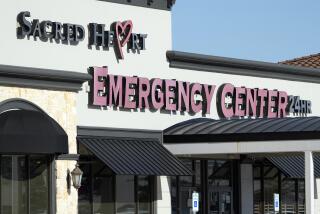U.S. Eases Rules on Requirements for Hospital Emergency Care
- Share via
WASHINGTON — The Bush administration has revised federal rules requiring hospitals to provide emergency medical care, easing some regulations about screening, providing specialists and transferring patients.
In California, the changes are unlikely to affect how emergency-room patients are treated, hospital officials said Wednesday, because the state’s stricter law remains in effect.
“We will continue to do what we’ve been doing all along -- providing complete screening and stabilization” of emergency-room patients, said Jim Lott, spokesman for the Hospital Assn. of Southern California. “I don’t see anything happening that will endanger anyone in California.”
But some emergency-room doctors at county-run hospitals in Los Angeles said they feared the new regulations would eliminate any incentives for private hospitals to provide specialists to care for the uninsured.
The new regulations amend the 1986 Emergency Medical Treatment and Labor Act.
That law requires any hospital participating in the Medicare program to provide appropriate medical screening for all patients seeking care in an emergency room or department, regardless of their ability to pay.
Hospital personnel must stabilize the condition of any patient determined to have a medical emergency or transfer the patient to another medical facility.
Hospitals can be suspended from Medicare and fined $50,000 each time they violate the law, which also gives patients denied emergency care the right to sue hospitals.
Other provisions require hospitals to make specialty physicians available around the clock for emergency care and to ensure that all hospital-owned treatment facilities, such as radiology clinics, laboratories and specialty hospitals, are capable of providing emergency care.
The administration’s changes relax those requirements, letting hospitals “share” on-call specialists and allowing specialty hospitals and outpatient clinics to transfer emergency patients to emergency departments, including those owned and operated by other hospitals.
Bush administration officials said Wednesday that their changes to the law, which the hospital industry had sought for years, simply clarify hospitals’ legal responsibilities to emergency-room patients.
“This regulation is going to make it easier for people to get emergency-room care,” said Thomas R. Barker, special assistant to the administrator of the Center for Medicare and Medicaid Services.
Hospital emergency departments have become the first place an increasing number of uninsured and underinsured patients turn to for medical care.
The American College of Emergency Physicians said the change allowing hospitals to share on-call specialists could backfire, resulting in a flood of emergency patients transferred to the declining number of hospitals that will choose to offer specialty care.
“It’s going to be unfortunate for most of the county hospitals and the big academic institutions,” which have to have such specialists on call, said Dr. Edward Newton, interim chairman of the emergency department at Los Angeles County-USC Medical Center.
Dr. Jack Lewin, chief executive of the California Medical Assn., said the changes to the regulations were overdue and would not result in worse care for the poor.
“We were in an either-or dilemma,” he said. “Either we close the emergency rooms in those hospitals or use better coordination.”
The American Hospital Assn. welcomed the new rule.
“It recognizes that in emergency departments, hospitals are seeing emergency patients and patients who do not have emergency needs,” said Washington counsel Maureen Mudron. But the California Nurses Assn. “condemned” the new rules.
“This policy could sign a death warrant for an unknown number of people, and aggravate pain and suffering for many others,” said association President Kay McVay.
“It may provide a boon for the funeral industry, but it will be a disaster for everyone else.”
*
Kemper reported from Washington and Weber from Los Angeles.
More to Read
Get the L.A. Times Politics newsletter
Deeply reported insights into legislation, politics and policy from Sacramento, Washington and beyond. In your inbox twice per week.
You may occasionally receive promotional content from the Los Angeles Times.










